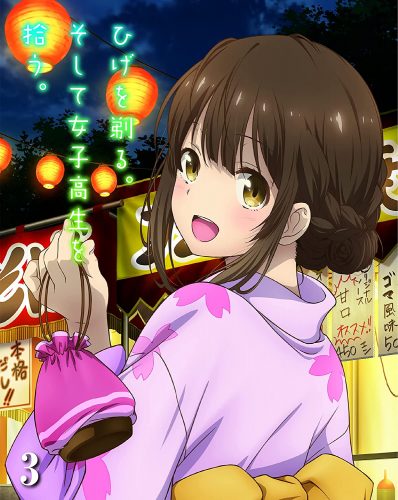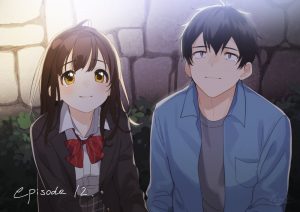
Age gap romances are incredibly controversial, for obvious reasons. Anime has been rather notorious for exploring taboo concepts in the romantic space—and the age gap has been well-explored by the medium. With Hige wo Soru. Soshite Joshikousei wo Hirou. (Higehiro: After Being Rejected, I Shaved and Took in a High School Runaway); however, the threat of the story going the way of exploring a romantic relationship between a teenager and an older guy seemed imminent. Long story short, we really liked this show and hoped that it would commit to its uniqueness! So, what worked and what didn’t in Higehiro: After Being Rejected, I Shaved and Took in a High School Runaway)? Let’s get into it!
Age-Gap Threat Averted
The most concerning thing was how this show seemed set up to have Ogiwara Sayu, a 17-year-old runaway from Hokkaido, primed for a romantic relationship with 26-year-old salaryman, Yoshida. When they meet, Sayu is sitting under a streetlight and Yoshida is walking home after getting drunk because his senpai at work wouldn’t notice him romantically. When the young girl asks him if she can stay at his place for a few days, drunk Yoshida agrees. When they get to his small apartment, he tells her to cook miso soup, the flavour of which is so good, drunk Yoshida’s decision to have her stay at his place seems like a good idea. Except, y’know, Sayu’s a child and he can’t harbour a minor without their parents’ permission, it’s a crime! Drunk Yoshida leaves all that to sober Yoshida, who gets the fright of his life waking up to a young girl cooking in his house!
Throughout the series, Sayu attempts to seduce Yoshida, but mostly in the beginning. Each time, Yoshida is clearly affected by the seduction but remains an adult by rejecting Sayu’s advances in a way that doesn’t destroy her confidence or make her feel weird. The series soon gets into why Sayu is so ready to have sex with this man she just met, but in the beginning, we have no access to Sayu’s past or Yoshida’s, so it looks like the makings of yet another age-gap romance anime. It also doesn’t help that when Yoshida’s colleagues find out about his new living arrangement, they constantly ask him if he’s fallen in love with Sayu or not, keeping the threat of that possibility alive in the mind of the viewer.
Even so; however, Yoshida’s stern position on the nature of his relationship with Sayu keeps this show from careening over the edge, and even in the final episode where Sayu attempts to initiate sex, Yoshida maintains that Sayu will always be an important person to him, and continues as he had been. This keeps the show on the side of wholesomeness, something we don’t really see enough of from characters in Yoshida’s position.
Harem?
After the main characters are introduced to each other, Higehiro takes us for a spin when it reveals two love interests for Yoshida. Mishima, a junior of his at work, and Gotou, his senpai who rejected his romantic advances despite harbouring romantic feelings of her own for him. The introduction of these two characters and their desire for a deepened relationship with Yoshida seemingly juxtaposed the deepening yet ambiguous relationship developing between him and Sayu.
While it became increasingly clear that the three main women in this show were interested in Yoshida romantically, his attention being trained on Sayu regardless of what happened around him made the show seem like it was heading in the direction of age-gap romance. However, Yoshida’s actions in the show continuously made it impossible for any kind of actual harem to happen because he’d consistently reject Sayu on the basis that she’s a child, he’d reject Mishima out of pure oblivion and he’d finally put the brakes on Gotou because he’s mad that she’d reject him despite wanting to be with him. At the end of it, the show’s romantic element is tossed to the backseat somewhat because there are honestly more important things to deal with.
Stress Every Single Week
The best part about Higehiro is how it continued to remind us how transient peace can be. In finding a new place to stay with Yoshida, Sayu manages to find a peaceful place to live for the first time in her life, and since her arrival in Tokyo, she’s able to stay with someone who isn’t going to take advantage of her. However, even though their lives grew incredibly wholesome with each passing week, there were several moments in which we saw the fleeting happiness Sayu managed to create slip through her fingers. The worst moment for this show objectively is the introduction of one of Sayu’s previous “guardians”.
When Sayu gets a part-time job at the nearby convenience store, she’s shocked to find out that one of her colleagues is someone she stayed with previously, someone who had taken advantage of her. That individual then manipulates her into inviting him to Yoshida’s place, where they’d be alone, and attempts to assault her again. Luckily, Asami from work contacted Yoshida because she sensed something was amiss and he managed to deescalate the situation. The creep is then forgiven by the cast and he carries on with life, even later helping Sayu hide from her older brother when he arrives at the convenience store to look for her.
This was one of the times when the show dropped the ball quite badly, as it’s unrealistic that Sayu or anyone else would be comfortable around such a person just because he apologized for it. It seemed to trivialize the gravity of his actions and the show lacked the necessary sensitivity to deal with those themes effectively, especially considering Sayu’s journey up until that point.
Higehiro is a show that was in dire need of content warnings. While it seems like it’s going to be a rather funny ride, it doesn’t waste time in positioning itself as a serious drama with serious themes from childhood abuse, to suicide, sexual assault, abandonment, attachment among several others. It just needed a lot more sensitivity when dealing with some of these themes.
Final Thoughts
Hige wo Soru. Soshite Joshikousei wo Hirou. (Higehiro: After Being Rejected, I Shaved and Took in a High School Runaway) was an emotional rollercoaster and each week had its fair share of drama. This was yet another unconventional romance and slice of life that could have gone either way, but the way in which the characters, plotline, and subversion of popular tropes worked together made this experience a pretty good one, one that we’ll remember for quite some time. What did you think about Higehiro? Drop a comment and tell us what you think!
Recommended Post
Top 10 Romance Light Novels [Best Recommendations]
Recommended Post







